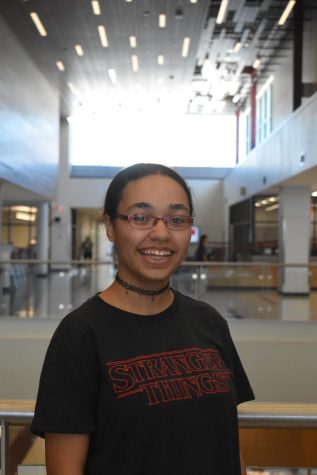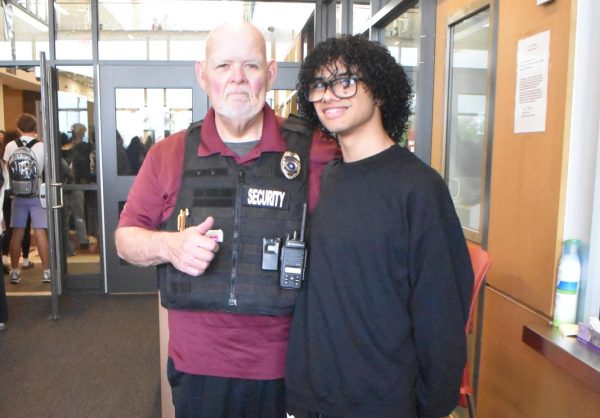English Department takes steps toward changing the curriculum
Sophomore Karinna Wolfe finalizes her website project for English class. Wolfe’s project was on the existence of God. After that class finished they did a day called the Webbi Awards and presented their projects.
The English department has been in the process of creating, modifying and implementing new changes to the English curriculum.
Teachers in the English department saw the curriculum needed improvement. After some of these teachers made their concerns known to the administration, action was taken to make a new, better curriculum for teachers to teach their students.
“Reading workshop started several years ago within our school district,” assistant to the Superintendent Hailey Fleegle said. “It started with our kindergarten through six classrooms, and then it transitioned to kindergarten through 12. …We started to look at what it was doing and what it needed to do. Was it what students needed? Did it meet all of our PA standards that we’re required to teach children? We found that there were repeats that were happening, and the high school team felt they needed to lift the level for high school students to the level so that children were being pushed with what they needed in their English classes. We met as a department to talk about what it would look like. Everyone liked the model of reading workshop but wanted to lift the level, so our teachers have taken on the task of writing their own units to lift the level for children.”
One of the reasons teachers expressed issues with the curriculum was because of reading workshop. Students expressed concerns that lessons and books were being repeated throughout their high school years.
“Those discussions started as I met with each group to talk about the different departments and what it was that we were going to look at and goals we were going to set for that department,” Fleegle said. “We’ve heard loud and clear from our teaching staff that we need to make a shift and a change because no one wants to repeat everything already taught. Now, it’s great to read a book one or two times because you gain something different, but we also recognize that it can be boring for kids to hear a book several times over and over. We wanted to make sure they were exposed to a variety of texts rather than the same text over and over again.”
During the 2021-22 school year, there was discussion about how to enhance the ELA curriculum. The English department also started to rework the units.
“The English department has spent a lot of inservice time over the past couple years meeting together by grade level,” English teacher Alyssa Hetrick said. “First we got together, and we had representatives from each grade level all come together. So we could look at what was being taught in ninth, tenth, eleventh and twelfth. All of our representatives sat down and looked at what we had and that’s when we made some decisions about moving certain units to other grade levels or just replacing units.”
The English department, along with some of the administration, got together in meetings to discuss changes to the curriculum. Sometimes the whole department worked together. Other times, they broke off into grade level teams. In the beginning, they started with coming up with ideas for each grade level. Tenth grade has a unit on social issues, eleventh grade has units on perseverance and individuality and twelfth grade has units on leadership, power structures and identity.
“We initially had a meeting where we came up with different ideas we thought would be beneficial with every level. Ninth grade students, what types of things do they need? What types of things do eleventh, tenth and twelfth grade students need? What types of ideas would be important for us to cover?” English department Head Jaclyn Flick said. “We started brainstorming thematic ideas, and we listed them on the board in my room.”
When the department first got together to change the curriculum, they had to come up with new ideas for the curriculum that go along with the state standards. State standards include what students should learn in each grade level in their different classes.
“We all brainstormed thematic ideas we thought would be beneficial for our students, and then we also looked at the standards as per the state. We incorporated those into the curriculum to make sure that students were obtaining all of the essential skills needed for success,” Flick said. “There’s things about writing informationally and writing narratively. Then there’s reading informationally and a few other standards.”
Teachers also incorporated some of their own ideas into the curriculum as they were making it. They used their expertise in teaching to brainstorm ideas they thought would be applicable to the grade levels that each teacher teaches.
“We’re incorporating the required skills that students need for success, as per the standards, and we’re also incorporating lessons that help students develop as people at the same time,” Flick said. “We are thinking of who they are as people and their character, socio emotional learning, those types of things. We’re making connections to who students are as people while also fulfilling the requirements for the state.”
One change made in ninth grade English was they are no longer reading “To Kill a Mockingbird.”
“In honors, we added ‘Into the Wild,’ in academic we added ‘Tuesdays with Morrie’ and in core it was replaced with ‘The Pact,’” Hetrick said. “We were looking at our curriculum, and we realized we had a lot of fiction in ninth grade. We had very little nonfiction aside from the supplemental articles we were using. That was one big change. We used to teach ‘To Kill a Mockingbird,’ and we got ready to replace it with one of those nonfiction texts. The other thing we had to look at once they asked us to have readers workshop units, so we had to make sure that we had enough time to balance it. Can we fit in two readers’ workshop units? Can we adapt the current curriculum or current units that we have to create a reading workshop unit?”
Fleegle took classes at Columbia University in New York. While there, she was trained in reading workshop. She also sent a team of teachers to New York for that same training.
“Reading workshop is laid out with units and modules that go kindergarten to eighth, but high schools now are embarking on using that method,” Fleegle said. “It’s a structure within the classroom where students are getting more opportunities to read instead of being just taught… I never taught secondary English. I never taught secondary school. You know, I was an elementary teacher and principal in elementary. I leaned on them for their knowledge of what they bring with the content area and their knowledge of secondary to be able to develop the curriculum.”
Though a lot of the ideas for the curriculum have already been made or implemented, the curriculum is still changing as teachers come up with new and better ideas and ways to teach.
“The first one isn’t always great, right?” English teacher Megan Leone said. “Then you learn, and you tweak. It’s like a living organism. The curriculum is always adapting. Then for reading workshop, we create master slides and all these things because it’s a modeling thing. We have a read aloud or a text that a whole class practices and then students go off into research.”

Hi! I am Myah Lear. I am a senior and I'm the media manager of the AAHS Mountain Echo staff. I have played viola since the fourth grade. After school,...







